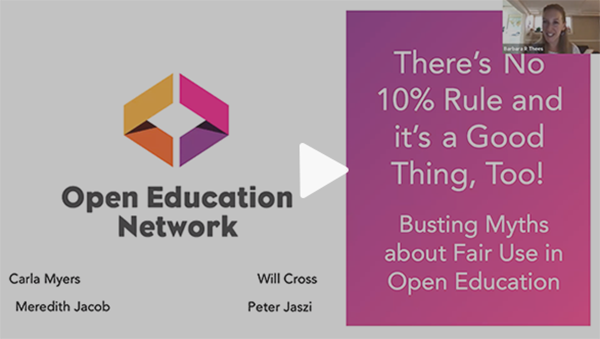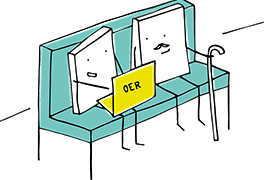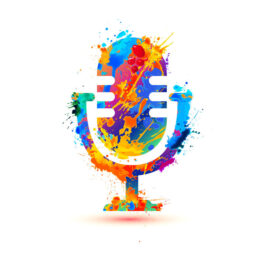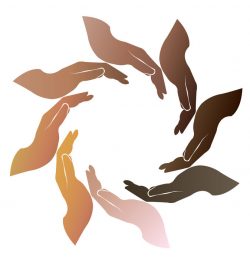Bringing TOPkit Digest to You
|
|
Contents of this Digest:
- Video Tip: Busting Myths about Fair Use in Open Education
- Announcements: Join "The TOPkit Community" on Discord
- Top Tips: Incorporating Copyrighted Content Legally & Ethically
- From the Community | Podcast: The Pandemic’s Impact on Open Educational Resources (OER)
- Call for Contributions: Share Your Expertise
- Top Community Topics
|
|
Busting Myths about Fair Use in Open Education
Misunderstandings and Misinformation |
|
|

|
|
The Open Education Network shares this webinar which discusses misunderstandings and misinformation about fair use for Open Educational Resources. Copyright myth busters Carla Myers and Will Cross share general information about fair use. The speakers also provide a path for incorporating fair use into OERs and open pedagogical practices.
|
|
MUST-READ ANNOUNCEMENT
Don't forget to join the "The TOPkit Community" on Discord to connect with friends and colleagues, access 2021 TOPkit Workshop sessions slides, and more. If you have questions about Discord, email us at TOPkit@ucf.edu.
|
|
Incorporating Copyrighted Content Legally & Ethically
Best Practices for Fair Use in Open Educational Resources |
|
|
|
| |
 |
Open Educational Resources (OERs) -- freely accessible and openly licensed materials used for teaching and learning -- have become more common in higher education as the need for affordable and accessible materials increases. While some of your faculty use OERs authored by others, many are creating their own OERs to fit the pedagogical needs of their specific courses. However, one of the most common challenges when creating OERs is copyright. Understanding what can or cannot be legally used in the creation of an open text can prove onerous and difficult, particularly when a specific work needed is still protected by copyright. Fair use, a part of copyright law that allows copyrighted works to be used for specific purposes, such as commentary, criticism, teaching and research, has long been avoided when creating OERs due to the open nature of the final works; yet, with careful understanding and pedagogical context, fair use can and should be applied to the creation of OERs.
|
|
|
|
|
|
|
|
|
#1 - Explore the Options. While fair use can and should be explored when creating OERs, it should not be the default in lieu of finding openly licensed materials or obtaining permission to use work(s) in a new OER. Conducting an environmental scan and determining what is pedagogically appropriate should be the first steps when identifying resources. Once identified, ascertain the copyright status, find alternative works that provide the same pedagogical outcomes when available, and outline steps needed for copyright permission, if appropriate. If a resource is critical to the creation of the OER but is protected by copyright, fair use may be considered.
|
|
#2 - Assess Fair Use on a Case-by-Case Basis. Fair use is complex and contextual. This means that even in some educational circumstances, fair use may or may not apply. How do we determine if fair use is appropriate for a specific work intended for inclusion in an OER? The Four Fair Use Factors is a benchmark that helps ascertain if a use is appropriate or not and should be utilized when exploring fair use.
|
|
#3 - Utilize the Code of Best Practices in Fair Use for OER. Launched in February 2021, the Code of Best Practices in Fair Use for Open Educational Resources offers excellent insight and information on how fair use may be utilized when creating OERs. This resource highlights general principles, considerations, and hard cases to aid those involved in creating OERs when navigating specific uses or scenarios that may be unclear or difficult. | |
#4 - Be Sure to Indicate Fair Use. Attribution should always be provided for resources used in an OER, as it is not only good ethical practice but also aligns with the transparent nature of the open movement. While there is not one specific way to indicate fair use and provide attribution, there are three alternatives that can be used: 1) Indirect Acknowledgement, 2) Direct Acknowledgment, and 3) Hybrid Acknowledgement. These different options will be dependent on institution, circumstance, and local best practices. #5 - Consult Librarians and Copyright Experts. In addition to the tips and resources already mentioned, librarians and copyright experts at your institution are excellent sources of information and assistance when navigating OERs, copyright, and fair use. Reaching out to them during the initial planning stages will aid in identifying copyright challenges earlier in the process.
*content adapted from: Code of Best Practices in Fair Use for OER, available at auw.cl/oer is licensed under CC BY 4.0
|
|
|
Sarah A. Norris, MLIS, Scholarly Communication Librarian, John C. Hitt Library, University of Central Florida (sarah.norris@ucf.edu)
|
|
The Pandemic’s Impact on Open Educational Resources (OER)
|
|
|
|
 | |
This podcast episode from Inside Higher Ed, hosted by Inside Higher Ed Co-founder and Editor Doug Lederman, discusses how the COVID-19 pandemic has impacted the use and adoption of Open Educational Resources and explores how your faculty might engage in OER use and creation going forward. It also highlights student perspectives on OER.
|
|
|
Sarah A. Norris, MLIS, Scholarly Communication Librarian, John C. Hitt Library, University of Central Florida (sarah.norris@ucf.edu)
|
|
Be a Part of the TOPkit Community
|
|
|
|
| |
 |
Read the TOPkit content contribution by Bevin Clare, professor at the Maryland University of Integrative Health (MUIH), about Launching a (Popular!) Peer Review Program: Fast, Fun and Formative.
TOPkit aims at offering adoptable and adaptable guidance and resources to those responsible for faculty development or those who guide faculty to teach online or hybrid courses. We are always looking for novel ways to enhance the practices of those collaborating with faculty to ensure effective online and hybrid courses. What expertise can you share in areas of planning, developing, or evaluating?
|
|
|
Content Coordinator and Contributor
Sarah A. Norris, MLIS, Scholarly Communication Librarian, John C. Hitt Library, University of Central Florida (sarah.norris@ucf.edu) Developer/Editor
Bren Bedford, MNM, Web Project Analyst, Center for Distributed Learning, University of Central Florida
Editor
Samantha Richardson, B.A. English, Communications Specialist, Pegasus Innovation Lab, Center for Distributed Learning, University of Central Florida
|
|
|





